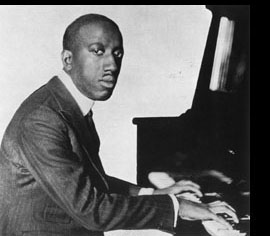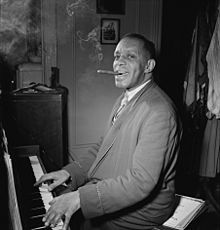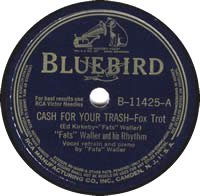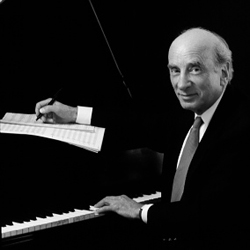Fats Waller, James P. Johnson and Willie ‘The Lion’ Smith are three exhilarating and masterful exponents of an East Coast style of jazz piano playing popular before WW II, called ‘Stride.’ The stride piano style is distinguished by large intervals played with the left hand, enabling the pianist to function as a one-man-band, playing bass accompaniment and melody at the same time. A special characteristic of the style is a highly syncopated, dancing rhythm. Our special guest Dick Hyman stands out as one of today’s few stride piano virtuosos.
.jpg)
Earle Hyman photo courtesy of the artist
Actor Earle Hyman, famous for his recurring role as Cliff’s father Russell Huxtable on the hit television series The Cosby Show, joins us to portray Willie ‘The Lion’ Smith in excerpts from Smith’s autobiography, Music on My Mind.
On the scene in New York from about 1915 to 1940, Harlem’s Big Three were James P. Johnson, Willie ‘The Lion’ Smith and Thomas ‘Fats’ Waller.
In the beginning there was only James P. Johnson. Born in New Brunswick, New Jersey in 1894, the ‘Father of Stride Piano’ grew up to be an unassuming man with a gentle disposition. Prolific in the sheer number of pieces he composed, and wide-ranging in the musical genres he embraced, Johnson wrote and recorded popular hit tunes like “The Charleston,” popular show music such as “If I Could Be With You One Hour Tonight,” and movie scores and major symphonic works including his “Yamekraw: A Negro Rhapsody,” in addition to many exceptional pieces in the stride piano style.

James P. Johnson photo courtesy of Wikimedia
‘James P’ was the first black artist to break through the race barrier and cut his own piano rolls. At the time, piano rolls were a popular technology for pianists to distribute their music outside the concert hall or nightclub setting. In the 1920s jazz singer and celebrity entertainer Ethel Waters said of Johnson, “All the licks you hear now originated with James P. Johnson. And I mean all the hot licks that ever came out of Fats Waller and the rest of the hot piano boys. They’re all faithful followers and protégés of that great man, Jimmy Johnson.”
James P’s first compositions demonstrate the variety of influences he absorbed early on—church music, blues, ragtime, even country square dance tunes. His family moved to New York in 1910 when Johnson was 14 years old, and for the first time the teenager heard music of Mozart, Beethoven, Wagner and Puccini in the city’s concert halls. Up in Harlem at Baron Wilkins’ nightclub, he listened to Jelly Roll Morton play piano. The diminutive Alberta Simmons, known for her own version of ragtime with a swinging bass, taught him all the rags she knew. (Ms. Simmons never recorded and is rarely seen in jazz encyclopedias but Thelonious Monk is another jazz piano legend to credit her as his teacher.)
On this radio show, Dick Hyman tells us how Johnson aspired to serious concert composition and wrote extensive through-composed pieces, though few have survived. Hyman and Cullum Band pianist John Sheridan give a duo performance of James P’s complex “Caprice Rag,” and Jim and the Band show off a unique, signature Cullum Band arrangement of James P’s “You’ve Got to Be Modernistic.” As with many innovative artists, the disciples of James P. Johnson’s piano style became far better known than he ever was.

Willie 'The Lion' Smith photo by Wm. Gottlieb. Courtesy Library of Congress
Willie “The Lion” Smith came into his own musically in the roughest parts of New York, in the clubs and dives of an area known as The Jungles between 60th and 63rd Streets in Hell’s Kitchen. James P. Johnson said, “The Lion was one of the sharpest ticklers (of the ivories) I ever met. He was a fine dresser, very careful about the cut of his clothes and a fine dancer too. When Willie Smith walked into a place, his every move was a picture.” In contrast to his shy friend, The Lion roared.
Over time, Willie Smith developed a reputation as one of the great self-promoters in early jazz history. Along with Jelly Roll Morton, The Lion was always ready to take a bow. Dick Hyman, who knew Smith personally and took piano instruction from him, says that Smith “cultivated flamboyance” with his derby hat and big cigar. Beneath the swagger, Smith had a sentimental, romantic side that can be heard in his compositions, especially two on our program tonight, “Morning Air” and “The Old Stamping Ground.”
Actor Earle Hyman portrays Willie ‘The Lion’ Smith, giving his unique perspective on the place of the East Coast in jazz history in this excerpt from his autobiography:
“A man’s music comes from his heart and soul. I played it all—barrel house, ragtime, blues, Dixieland, boogie-woogie, Swing, Be-bop, Bop, even the classics. It doesn’t make any difference what names the writers and music critics paste on it. It’s all music, and it’s all an expression from the soul of a human being. Writers have called our piano style here on the Eastern seaboard ‘Harlem Stride’ piano. I’m not very sure I know what they’re talking about. I do know how we play it in the East. A good pianist had to be able to play with both hands performing in perfect unison. We had such control we could play a different song with each hand at the same time. Yes, sir you can take my word for it, there was a lot of jazz played and sung in other places besides New Orleans in the early days. Another thing—all the riverboat jazz bands weren’t on the Mississippi River, either. There were jazz bands on the boats going up and down the Hudson River, too. I recall as a boy seeing and hearing bands on the boats with white and Negro musicians playing together. That was something you didn’t see on the Mississippi. It all goes to prove that music doesn’t stem from any single race, creed or locality. It comes from a mixture of all of these things—as does the Lion.”
Earle Hyman also brings to life Smith’s recollections of the heady days of Harlem “rent parties” in the late 1920s. Tenants short on cash would raise their monthly rent money by throwing parties and charging admission:
Piano players called these affairs “jumps” or “shouts.” At the peak of the house party days in the late ‘20s, the “big three” who were most in demand were The Lion, Jimmy Johnson and our “shadow,” Fats Waller. It got so we never stopped, and were up and down 5th, 7th and Lenox all night long hitting the keys…we’d embroider the melodies with our own original ideas and try to develop patterns that had more originality than those played before us. It was pure improvisation.
.jpg)
Fats Waller photo courtesy of Wikimedia
Thomas ‘Fats’ Waller came by his nickname honestly. For most of his adult life, he weighed in at just under 300 lbs. Fats was a roly-poly kid of 15 when he first met his mentor James P. Johnson. Waller played the organ at church, and piano in the school orchestra at P.S. 89 in Harlem. His parents were horrified at the idea of jazz, ‘the devil’s music,’ but whenever he could Fats would listen to Johnson’s piano rolls. Fats finally met his hero in person and James P recognized in a flash that the boy had what it takes to be a great jazz player, and began to offer him piano instruction free of charge. Dick Hyman tells host David Holt, “Johnson and Smith were the mentors, the “daddies” to Fats Waller, who was just a kid when they found him and taught him everything they knew…[Waller] went on even to surpass them in some ways.“
Fats Waller made close to a thousand recordings in his lifetime. He wrote tunes that topped the charts then and are still popular today—classics like “Honeysuckle Rose” and “Keepin’ Out of Mischief.” Waller’s “Ain’t Misbehavin’” is heard on our broadcast first in Fats Waller’s original hit recording, and then live from the stage of The Landing by The Jim Cullum Jazz Band with Dick Hyman. Later, Hyman and Sheridan perform a duet on two Waller melodies, “Sugar Rose” and “How Can You Face Me?”

Fats Waller Bluebird label. Photo courtesy library.umkc.edu
In another interview with host David Holt, Dick Hyman explains that because Fats Waller had such a naturally comedic personality, “the public wasn’t all that concerned that he was such a marvelous pianist.” Waller’s so called ‘race records’ for the RCA Bluebird label evoked the outrageous “rent party” atmosphere and sold in the millions of copies across the color barrier. Fats Waller’s comic antics and his stellar songwriting talent in combination with his hot piano playing accelerated his celebrity, making him the best known of the Harlem Big Three down through the decades.
Text based on Riverwalk Jazz script by Margaret Moos Pick ©1991


